INDIANAPOLIS (WISH) — The U.S. Seventh Circuit Court of Appeals in Chicago has upheld a preliminary injunction allowing two Indiana mothers to continue providing paid attendant care to their medically complex children.
The court’s ruling, issued Monday, ensures that the children can continue to receive care from their trained mothers, allowing them to remain at home rather than face potential institutionalization.
The court’s decision also blocks a policy change in 2024 by the Indiana Family and Social Services Administration (FSSA) that would have prohibited parents from being paid caregivers under the Health and Wellness Medicaid Waiver Program. The changes came after Indiana’s top budget writers learned of a billion-dollar funding shortfall.
The Indiana Disability Rights and the ACLU of Indiana in May 2024 filed the lawsuit, arguing that the FSSA’s policy change violated the Americans with Disabilities Act (ADA) by risking institutionalization of the children.
The U.S. Supreme Court’s Olmstead v. L.C. decision, which found that unjustified institutionalization of people with disabilities is a form of discrimination under the ADA, was a key factor in the court’s ruling, the ACLU said.
The appeals court ruling agreed with the district court ruling, saying, in part, “The attendant care that Plaintiffs seek from their mothers is necessary to prevent them from being uprooted from their homes, families, and support systems. In the absence of preliminary injunctive relief, Plaintiffs are highly likely to be institutionalized” and suffer irreparable harm without immediate relief.
As the Indiana Capital Chronicle reported in May 2024 after the lawsuit was filed, “Indiana’s Family and Social Services Administration (FSSA) previously allowed parents to be paid hourly wages as Legally Responsible Individuals through an attendant care program. In January (2024), after the agency said ballooning program costs contributed to a nearly $1 billion Medicaid forecasting error, FSSA said it would transition families to Structured Family Caregiving.”
News 8 reached out via email to the Indiana Attorney General’s Office after hours Wednesday for a comment but did not immediately received a response.
According to the original lawsuit, one of the children in the lawsuit, a 6-year-old boy from Mitchell, has a rare genetic disorder that causes chronic lung disease, respiratory issues and epilepsy. He is partially deaf, partially blind, nonverbal and non-ambulatory.
The other child, a 10-year-old from Indianapolis, has a type of brain damage that affects the central nervous system. He is also nonverbal and deaf.
- Lawmakers wary as Medicaid agency claims better financial footing
- FSSA officials still unable to fully explain billion-dollar shortfall
- Disability advocate says attendant care families face tough choice

